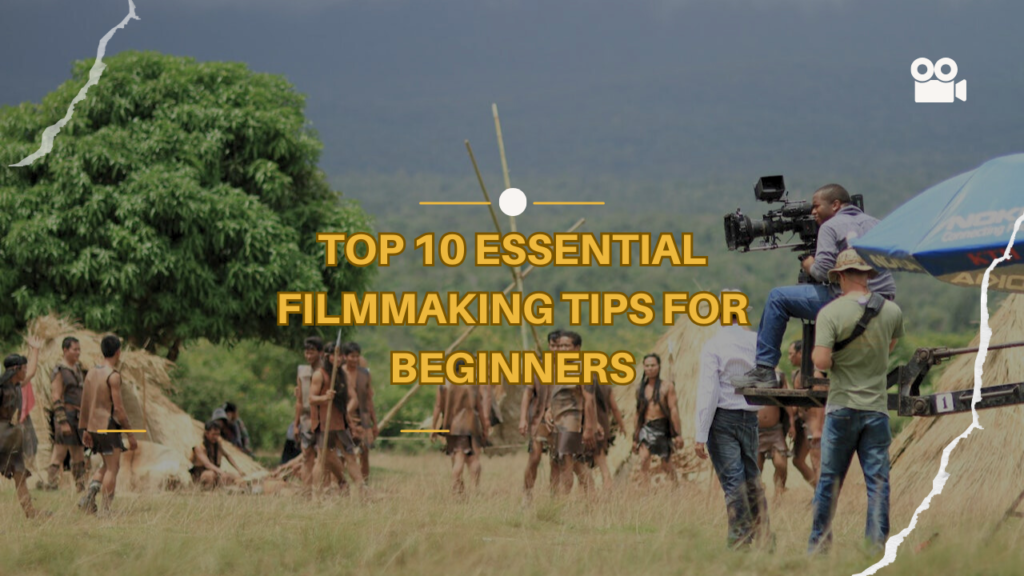Entering the world of filmmaking can be both exhilarating and overwhelming. The combination of creative vision, technical skills, and storytelling can be challenging, especially for beginners. To help you get started on the right foot, we’ve compiled a comprehensive guide with the top 10 essential filmmaking tips for beginners. These fundamental tips and best practices will set you on the path to creating compelling and professional-looking films.
1. Start with a Strong Script
The foundation of any great film is a strong script. A well-written script provides a clear blueprint for your project, detailing the story, characters, and dialogue. Take the time to develop a compelling narrative with well-rounded characters and a clear structure. Remember, even the best cinematography and special effects can’t save a film with a weak story.

Tip: Focus on the three-act structure: setup, confrontation, and resolution. This classic format helps keep your story organized and engaging.
2. Plan Thoroughly with Storyboards
Storyboarding is a crucial step in pre-production. It involves creating visual representations of each shot, helping you plan the flow of the film and visualize how scenes will unfold. Storyboards serve as a roadmap during shooting, ensuring you capture all necessary shots and stay true to your vision.

Tip: Use simple sketches or digital tools to create your storyboards. Include notes on camera angles, movements, and important actions.
3. Understand Your Equipment
Familiarize yourself with the equipment you’ll be using. Whether you’re shooting with a DSLR, mirrorless camera, or a smartphone, understanding the capabilities and limitations of your gear is essential. Learn the basics of camera settings, such as ISO, aperture, and shutter speed, to achieve the best results.

Tip: Practice shooting in different lighting conditions and settings to get comfortable with adjusting your equipment.
4. Focus on Composition
Composition refers to how elements are arranged within the frame. Good composition enhances the visual appeal and storytelling of your film. Use techniques like the rule of thirds, leading lines, and framing to create dynamic and balanced shots.

Tip: Before hitting the record button, take a moment to frame your shot carefully. Consider the placement of your subject and background elements.
5. Master Lighting Basics
Lighting is a key factor in setting the mood and atmosphere of your film. Learn the basics of three-point lighting (key light, fill light, and backlight) to create well-lit scenes. Natural light can also be a powerful tool, but it requires careful planning and timing.

Tip: Experiment with different lighting setups to understand how light and shadow can affect the tone of your scenes.
6. Capture Quality Audio
Poor audio quality can detract from even the most visually stunning film. Invest in a good microphone and learn the basics of sound recording. Pay attention to ambient noise and ensure dialogue is clear and free from background distractions.

Tip: Use a boom microphone or lavalier mic close to the source of sound for the best audio quality.
7. Be Efficient with Your Shots
Filmmaking can be time-consuming and costly. Plan your shots to be as efficient as possible. Use shot lists to organize your shooting schedule and minimize unnecessary retakes. This approach saves time and keeps your cast and crew focused.

Tip: Group shots by location and setup to reduce the time spent moving equipment and resetting scenes.
8. Edit with Purpose
Editing is where your film truly comes together. Use editing software to cut, arrange, and enhance your footage. Pay attention to pacing, continuity, and the overall flow of your film. Don’t be afraid to make tough decisions in the editing room—sometimes less is more.

Tip: Learn the basic functions of your editing software and experiment with different editing styles to find what best suits your film.
9. Add Music and Sound Effects
Music and sound effects play a crucial role in enhancing the emotional impact of your film. Choose music that complements the tone and mood of your scenes. Sound effects can add depth and realism, making your film more immersive.

Tip: Be mindful of copyright when selecting music. There are many royalty-free music libraries available for filmmakers.
10. Seek Feedback and Learn from Criticism
Finally, be open to feedback and constructive criticism. Share your work with trusted friends, mentors, or fellow filmmakers. Their insights can help you identify strengths and areas for improvement. Use this feedback to refine your skills and make better films.

Tip: Join filmmaking communities and participate in workshops or film festivals to connect with other filmmakers and gain valuable experience.
Conclusion
Starting your filmmaking journey can be daunting, but with these essential tips, you’ll be well-equipped to create captivating and professional-looking films. Remember, filmmaking is a learning process, and each project is an opportunity to grow and improve. Embrace the challenges, stay creative, and most importantly, have fun telling your stories. Happy filmmaking!

















